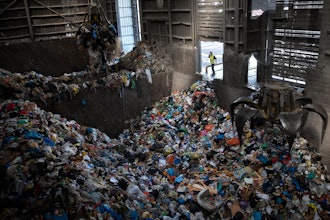UNITED NATIONS (AP) -- The highest-level conference yet on climate change opened Tuesday with 100 world leaders gathering at the United Nations to try to jumpstart stalled negotiations toward a global climate pact.
U.N. Secretary-General Ban Ki-moon called on presidents, prime ministers and other leaders "to accelerate the pace of negotations and to strengthen the ambition of what is on offer" for a deal at Copenhagen, Denmark in December.
"Failure to reach broad agreement in Copenhagen would be morally inexcusable, economically short-sighted and politically unwise," he warned. "The science demands it. The world economy needs it."
Much attention is fixed on U.S. President Barack Obama's first U.N. speech, where he said the United States is "determined to act."
"The threat from climate change is serious, it is urgent, and it is growing," he said, after receiving loud applause. "And the time we have to reverse this tide is running out."
Obama said the U.S. is doubling the generating capacity from wind and other renewable resources in three years, launching offshore wind energy projects and spending billions to capture carbon pollution from coal plants.
Obama has announced a target of returning to 1990 levels of greenhouse emissions by 2020. But with the U.S. lagging on climate legislation, more specific and ambitious plans are expected from China, India and other major economies.
Tuesday's U.N. summit and the G-20 summit in Pittsburgh later this week seek to add pressure on rich nations to commit to greenhouse gas cuts and to pay for poorer nations to burn less coal and preserve their forests.
Heat waves, droughts, melting glaciers, loss of the Greenland ice sheet and other dangers are fast approaching, said Rajendra Pachauri, chairman of the U.N. Intergovernmental Panel on Climate Change that shared the Nobel Peace Prize with former vice president Al Gore in 2007.
"The science leaves us with no room for inaction now," he said.
The presidents of China, India and other major economies were expected to spell out national plans for billions of people and their households, businesses and farms in the decades ahead.
China and the U.S. each account for about 20 percent of all the world's greenhouse gas pollution created when coal, natural gas or oil are burned. The European Union is next, generating 14 percent, followed by Russia and India, which each account for 5 percent.
The United States, under former President George W. Bush's administration, long cited inaction by China and India as the reason for rejecting mandatory cuts in greenhouse gases.
But neither China nor India say they will agree to binding greenhouse-gas cuts like those envisioned in a new climate pact to start in 2013. They question why they should, when not even the U.S. will agree to join rich nations in scaling back their pollution.
"The crisis today on climate change is the inability of the United States to put on the table credible emissions reduction targets for 2020," said Jairam Ramesh, India's environment minister.
The EU is urging other rich countries to match its pledge to cut emissions by 20 percent from 1990 levels by 2020, and has said it would cut up to 30 percent if other rich countries follow suit.
Japan's incoming prime minister, whose nation generates more than 4 percent of the world's greenhouse gases, has announced a new goal of a 25 percent cut in greenhouse gas emissions from 1990 levels by 2020.
China's ambition to grow quickly but cleanly soon may vault it to "front-runner" status -- far ahead of the United States -- in taking on global warming, the U.N. climate chief said Monday.
"China and India have announced very ambitious national climate change plans. In the case of China, so ambitious that it could well become the front-runner in the fight to address climate change," U.N. climate chief Yvo de Boer told The Associated Press. "The big question mark is the U.S."






















